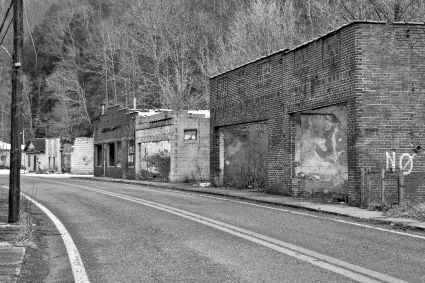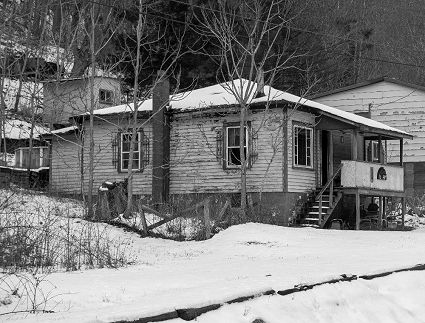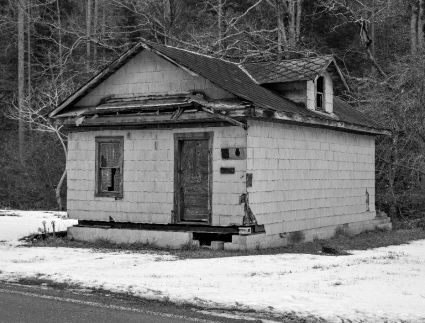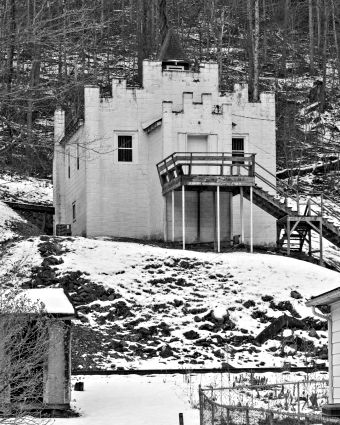RHODELL

Rhodell Former Rhodell Perry Radford remembered the Ms. Farrugia's store: "I remember the two deep freezers where she kept the meat. I remember the front counter where she kept the candy. I remember the sort of table facing the back wall where she kept my favorite 5 cent chocolate icing-filled cakes. I remember the faded white curtain that she used as the doorway that leads to the back of the store. I remember the verbal language she used to advertised. If I came into the store, she would always tell me to tell my mother what meats she had gotten into the store. I remember the watermelons and other produce that she kept outside on the front of the store. I remember Tootsie, with blonde hair and a pony-tail, working in the store. I remember the book of tickets she used for each person's accounts. There was so much that I remembered about her place. But mostly, I remember her."
The following photos were taken in Rhodell in 2020 by photographer David Dunlap. He was kind enough to share them with the world through this website.
Click on each image for a high resolution version.
Perry shared some of his memories with us: "I have been thinking a lot about West Virginia lately. In the late 50's and early 60's when I was growing up on that quarter of a mile
stretch of land across the creek, at the bottom of a mountain, this would be the time when Spring was
in the air. The torrential effects of the March rains would give way to a seeming pause in April as
nature's orchestra of wildflowers of every kind, and insects of varying species, and the thawing grounds
awaits the Creator's queue to commence its springtime sonata, the likes of which even a Beethoven or
Mendelssohn could not compose. Like a bow gliding along violin strings, the creek that flowed in front of our house
seemed to have its own distinctive springtime melody. Perhaps it was a mixture of the flowing waters of Stonecoal Creek and the
sound on insects and other organisms living in its waters that made this unforgettable composition. Soon, muskrats swimming along
the banks and tarpons (that's turtles for the uninitiated) losing footing and rolling down the mountain would join the chorus.
I use to look so forward to the springtime. The cold ground of the past 4 or 5 months would be thawed enough for springtime play as
thawing grounds gave way to horseshoe spikes, circles for a good game of marble play and hopscotch diagrams. One of my two favorite
pastimes was to lay on the ground and watch the clous formations in the sky with my buddy. I did say, "two favorite pastimes." The other
of the two was to get up early Saturday morning, get a stick, some twine (for the younger generation, twine is string), some fish
hooks, a rock for a sinker and go fishing all by myself. The foliage with its greens, reds and yellow hues were thick enough to
satisfy my need for solitude and sparse enough to allow the occasional breeze to pass through, making me feel, somehow, one with
it all. No one worried about whether or not I had been abducted. It wasn't necessary. The community behaved in such a way that
made certain that no matter where the children were, they were safe. What more could you ask for?
"In the spring of the year, the mountains above that cluster of houses where we had lived thawed out enough to be climbable and
become part of our playground with the possibilities for adventures as vast as the mountains themselves, and the thicker the foliage, the
more adventurous the play. We climbed trees and cut them and made Indian teepees like the ones we saw on TV. We picked flowers and gave
them to people for the joy of giving, and we often challenged ourselves to see how high we could actually climb. We knew what to
do in case of the snake bite that never happened, thank God, or at least we thought we knew what to do, and we were always equipped
for the possibility. It made life more interesting.
"That entire side of the creek bank seemed to belong to me, and that included the mountain and the creek, because I was free to play
any and everywhere, except for under Mrs. Sue's house where her dog, Patsy, was and you can imagine why. Patsy was very territorial
and she had a reputation of breaking chains that tied her down when she needed to.
"It never occurred to me that this place that I still feel in my soul would one day be only a memory. But is it only a memory?
I think not because it still lives and breathes and energizes me when I need grounding. Recently, I visited the old place. I beat
down the bushes and braved the danger of being snake-bitten to go to that side of the creek that has now been uninhabited for over 50 years,
and I stood there and just remembered. I could imagine some of the town's folk on the other side of the creek wondering what that
strange man was doing over there in the woods. In this essay, I have tried to capture the reason I was standing there. I cannot
imagine heaven being much better than some of the experiences that I was privileged to have and yet I am told that it is far
beyond my imagination, so I am in for quite a treat because I have made Jesus Lord of my life according to Romans 10:9 & 10. What a
great God we serve to give us places where we can get away and experience Him."
is the only incorporated town on Stonecoal Creek or Winding Gulf Creek dissolved its municipal government in 2017. The original name of the town was Rhodesdale. There were two coal mines operating simultaneously on each
end of Rhodell. The Francis mine at Rhodell was opened by the E.C. Minter Coal Co. in 1921, and the Rhodell Coal Co. opened the mine at the southern end of town, also known as Stonecoal Junction, in 1918.

Image courtesy of Perry Radford
Perry Radford contributed this picture of coal miners in Rhodell in 1959. "Three of the men are my uncles and one is my father. From left to right is my father, Nathaniel Radford. He mined coal for 21 years before moving us to Washington DC where he worked and retired from the Government Printing Office. He was also a deacon at the Baptist Church
in the town where this picture was taken - First Baptist of Rhodell - and he had six children. Next to him is my Uncle Andrew Lewis Radford, Jr. He was a WWII Vet and a Golden Gloves fighter. The word is that he beat Ezzard
Charles, who eventually beat Joe Louis. He also had six children. He mined coal for 20 some years before moving to Columbus, Ohio to work in the steel mills. Next is my Uncle Charles Herschel Radford, who was also a
WWII veteran. He mined coal for 20 some years before moving to Columbus, Ohio to work in the steel mills, and had 9 children. Next is my uncle Horace Jesse Radford, who is the oldest of them all. He is also a WWII veteran with
seven children. He mined coal for 20 some years before he passed away. All of them were known throughout the area as good guys."

Feb. 2001 image by author
"Downtown" Rhodell.

Dec. 1997 image by author
The late Ms. Farrugia, a Sicilian immigrant, owned this store. She came to America around 1922, and I met her when she was still running this store in 1987, a very
late date to still find a first generation immigrant to the WV coalfields. In the early 21st Century, one could still meet a few second generation sons and daughters of these immigrants at St. Francis de Sales Church in Beckley, but they have gone extinct now. Their childern and grandchildren have dispersed from the
area, returning it to the Anglo-Scotch population that was there before the mines opened.

Dec. 2014 image by author
On a return trip to Rhodell I found the little downtown section had became rather devastated over the years. I remember in the 1990s there was still a little
grocery store and a few other small businesses in Rhodell. Also, a religious lady was running a clinic. But by the time Rhodell city management
dissolved their town charter in 2017 there were no business left in the town.

Feb. 2001 image by author
Coal camp houses in Rhodell, probably for the Francis mine.

Dec. 2014 image by author
In 2014 I found many of these company houses still inhabited.

Dec. 2014 image by author
The company houses at the other end of town, built by the Rhodell Coal Co., have not fared as well.

Dec. 2014 image by author
Very few of the houses at the Stonecoal Junction section of Rhodell are still inhabited. They are the same style of coal camp house as found
on the north end of town.

Dec. 2014 image by author
The last thing you will see as you leave town.

Feb. 2001 image by author
Train tunnel near Rhodell

March 2010 image by author
A church that is still active in Rhodell.

January 2018 image by author
Probably an air shaft.

January 2018 image by author
A "castle" church.

This commercial section of Rhodell looks like a bomb was dropped on it.

What's interesting about this coal camp house is the window shutters appear to be the original ones that the coal company installed many years ago.

I'd like to know what purpose this little structure with original asbestos roofing served. Coal company doctor's office?

The "castle church."

Image courtesy of Perry Radford
Perry Radford also sent in this photo, which he describes: "The picture I am submitting for your consideration
is a picture of my father Nathaniel Radford, Uncle Andrew Lewis Radford, Jr., Charles Herschel Radford, Sr. and Horace Jesse Radford with their mother, my grandmother, Lillie Mae Radford.
I believe they were taken in Francis, West Virginia which is the unincorporated town right next to Rhodell. Thanks and God bless."
SOUTHERN WEST VIRGINIA COALFIELDS